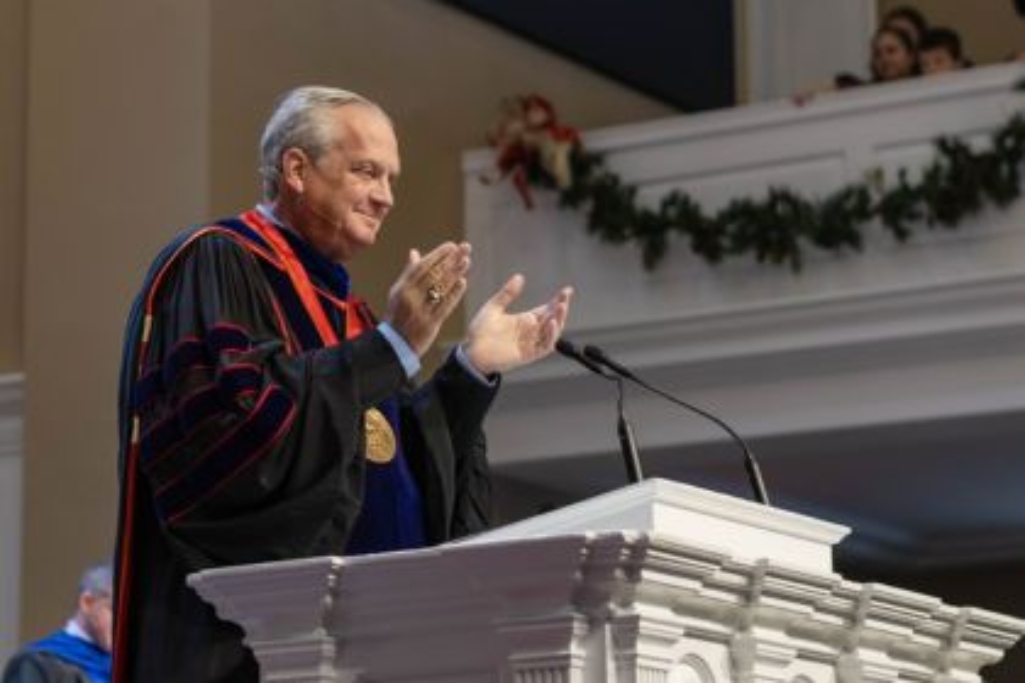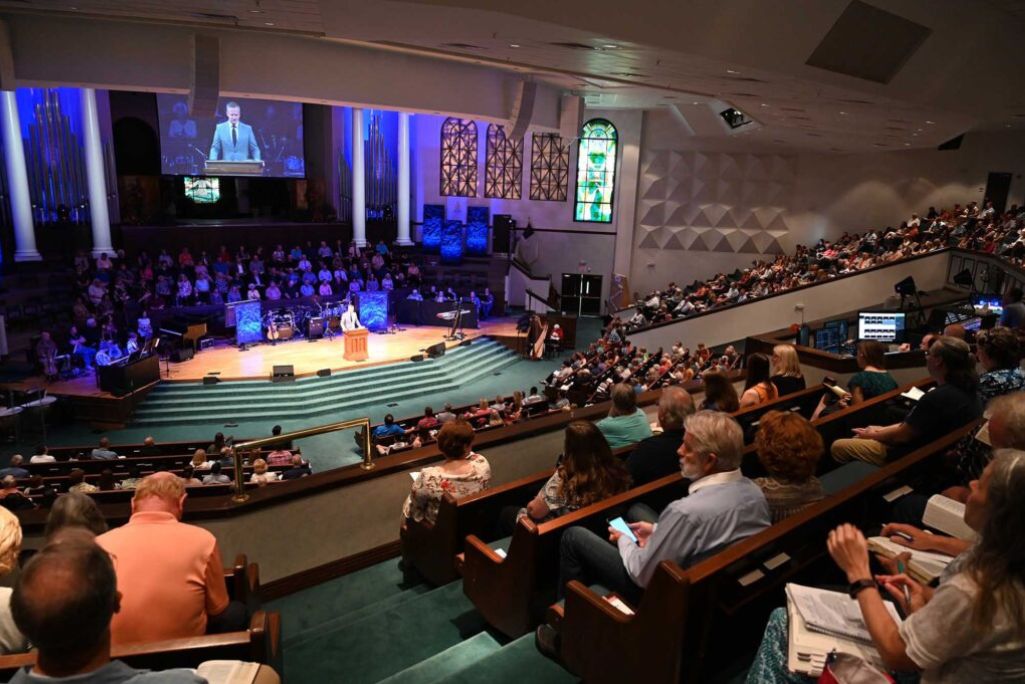
NASHVILLE (BP) — The four men who have announced their willingness to be nominated for Southern Baptist Convention president in June addressed issues such as sexual abuse reforms in the SBC, a constitutional amendment calling for only males to serve as pastors of any kind, what is “friendly cooperation” in the SBC and transparency among entities.
Tom Ascol, pastor of Grace Baptist Church in Cape Coral, Fla., hosted the forum as a Spaces event on his X (formerly Twitter) account Tuesday evening, March 26.
The expected nominees taking part were Jared Moore, pastor of Homesteads Baptist Church in Crossville, Tenn.; Clint Pressley, pastor of Hickory Grove Baptist Church in Charlotte; Mike Keahbone, pastor of First Baptist in Lawton, Okla.; and David Allen, professor and dean at Mid-America Baptist Theological Seminary.
Sexual abuse response
Nearly half of the 1-hour- 47-minute discussion addressed sexual abuse reforms in the SBC, beginning with Ascol putting forward the question over whether it was legitimate to qualify the level of abuse in SBC churches as “systemic,” or in the words of former ERLC President Russell Moore, an “apocalypse.”
“It’s such a heinous sin … [but] the short answer is no, there is not an abuse crisis in the SBC,” said Jared Moore, while acknowledging individual high-profile cases of abuse.
Positives have emerged from sexual abuse reforms, he added, such as the Caring Well curriculum and training for recognizing and preventing abuse. But overall, “there is no tangible proof that children are safer today in the SBC than they were five years ago [before abuse reforms].”
Allen, likewise, agreed that abuse could not be “legitimately described as a crisis” in Southern Baptist churches.
“There’s no doubt [it’s] a serious issue,” he said, and one that deserves attention.
“Sexual abuse can’t be ignored. Survivors deserve justice … their voic[es] heard, and I believe the convention must do everything responsibly within our power to prevent sexual abuse.”
Local churches should take the lead on addressing matters of sexual abuse, Allen pointed out, with the SBC’s involvement concentrated on training, abuse prevention and survivor care.
“We’re going to need heavenly wisdom … to address the issue,” he said.
Keahbone, a member of the Abuse Reform Implementation Task Force (ARITF), said the framing of the question was important.
“I do believe that it’s a crisis,” he said, pointing to the amount of activity he has witnessed in the ARITF of church leaders reaching out for help.
“We’re dealing with it all the time, getting more reports, hearing about it more and more.”
Citing established figures can be misleading he said, adding that two-thirds of abuse cases aren’t reported to authorities.
“When a pastor or a victim is going through this, this is the worst crisis they have ever had to endure. And so, I think it was necessary for us to look at the system and make sure that there wasn’t any kind of systematic process that created this … or helped promote this in any way, shape or form.
“I don’t look at the dollars as … wasted. I think it was necessary for us to see where we were at and what was going on. I praise God that, so far, it looks like there wasn’t a systematic process that made all these things happen. But what it hasn’t addressed is the definite abuse that we’re seeing in lots of churches all over the country.”
Pressley called even one case of abuse and a victim a crisis and “the Christian impulse is to run toward that crisis.” The SBC did that, but he described the response as also creating a “fog” that limited clear vision.
“With that fog clearing up a little bit, we are seeing this is not a system-wide crisis,” he said. “It is a crisis, but it’s not showing up in every church. However, every church needs to be prepared. Every church needs to react.”
A positive to emerge from that fog is a heightened awareness of sexual abuse and its potential to infiltrate churches as well as a desire for prevention training, Pressley added.
Future of abuse reform
Discussions over funding have suggested that all Southern Baptist churches, guilty or not of harboring sexual abuse, should support training and any kind of remuneration to sexual abuse survivors, Ascol said, later acknowledging that nothing official had been proposed. Do the candidates support that?
“That’s not what’s being asked [of churches],” Keahbone said. “It’s not even on the table. The beauty of Southern Baptists is the voluntary cooperation. If a church wants to help, they should be able to. If they don’t, they don’t have to.”
Other candidates agreed that churches should have the right on whether to participate or not in such funding.
“The SBC is a voluntary association of churches, and my church is not responsible for what a church 1,000 miles away did,” Moore said.
“I think it’s a bridge too far,” Allen noted. “I think that’s a form of corporate guilt … and unwise and even opens the door to lawsuits.”
“A church has the freedom to do that, [but] should not be held responsible to do that,” Pressley said.
Candidates were asked about the potential launch of an Abuse Response Commission and steps to fund it.
Allen pointed to “a lot of uncertainty” about the ARC’s establishment and funding while noting individuals’ rights to establish any group they would like to.
“I’m concerned, since this group is independent and not under any accountability control of the SBC … of any money going to that group,” he said.
Pressley admitted it made him “a little nervous” that entity heads “were slow to get behind” the group, as Send Relief announced its original financial gifts to sexual abuse reforms would not be going to ARC.
“I think we just don’t know enough about how [the funding] works,” he said. “We want to support what is good. We’re just not convinced yet that that’s the right thing to do.”
Moore called “a blank check to another ministry … the wrong move.”
The creation of a database of those credibly accused of sexual abuse has been central to discussion of reforms. One of ARC’s purposes would be to host and manage such as database.
Moore suggested it would be better for churches to take advantage of curriculum and other training options and deal directly with local police when it came to reporting.
“The database is about offenders [and] preventing the second abuse [case], not the first,” he said. “… As a local Southern Baptist pastor, it sounds like the SBC version of the FBI. To think that we can investigate potential abuse claims is so unrealistic and unachievable. I admire the zeal, but think they’re mistaken.”
Keahbone expressed his strong support for the ARC as “a great step” for how the SBC needs to continue its sexual abuse response.
Efforts to fulfill the recommendations voted on by messengers were “exhausted” he said, with various SBC leaders telling the ARITF that such steps could not be taken within the convention.
That led to talks of establishing an outside organization – ARC. Keahbone is among the organization’s incorporators alongside ARITF chair Josh Wester and current fellow ARITF members Melissa Bowen, Brad Eubank and Jon Nelson. Former ARITF chair Marshall Blalock will also join.
Discussions with SBC leaders over ARC’s formation brought positive responses, Keahbone said. Funding discussions at no point included the possibility of using Cooperative Program gifts, but entities were asked to consider how they could help.
The Ethics & Religious Liberty Commission announced last week that a $250,000 gift from monies initially set aside in 2021 would be given toward the ARITF as it “wraps up its work.” Regarding the $4 million from Send Relief initially earmarked for sexual abuse reforms, Keahbone characterized those talks as a “difference of opinion” as to where it would go.
The Amendment
Shifting to the upcoming vote on an amendment to the SBC Constitution clarifying that only men should use the title of “pastor,” candidates were asked if they felt there was a “crisis of women pastors” in the SBC and if they supported what has become known as the Law Amendment, referencing Virginia pastor Mike Law.
“I do not see it as a crisis, although I can see us pointed in that direction, and I do want the Law Amendment to pass,” said Pressley, noting that he was an early supporter.
“It repeats our [Baptist Faith and Message] confession,” said Moore in voicing his support. “… This states it even clearer to where it will be in the constitution.
“I’ve heard reports that there are over 1,500 SBC churches that have women pastors in some form or fashion. … That sounds like a pretty big deal and something we need to deal with now.”
Allen did not feel the issue of women pastors in the SBC amounted to the level of a “crisis,” though “it is a problem.”
He cited an article published last year that, ultimately, claimed that more than 1,800 women were serving in pastoral leadership roles in churches affiliated, at least partially, with the Southern Baptist Convention.
Those figures came from the SBC’s searchable database of churches. A random selection of 3,847 churches brought “99 SBC churches with female pastors and a total of 149 female pastors,” the article claimed. The figure cited by Allen came about by those results being extrapolated to the 47,614 SBC churches.
An accompanying Google document presents the findings of the original query. Of those 99 churches, 11 of them include a variation of either “lead” or “senior” alongside the word “pastor” or “elder” in their title.
Five were co-lead pastor alongside their husband. Two are senior pastors. The rest are titled lead pastor, senior leader, senior elder and lead elder. The 88 remaining on the list fill roles such as “worship pastor,” “children’s pastor” and “associate pastor” overseeing various ministries.
Keahbone urged caution in using the term “crisis,” calling into question those who may be inclined to describe women pastors in the SBC as a crisis but not the issue of sexual abuse.
Stating that he would not be voting in favor of the amendment, Keahbone repeated his devotion to complementarianism and that the role of pastor is reserved for men. He further stated that the SBC’s current system in place proved itself last summer with the vote to disfellowship Saddleback Church, the largest church affiliated with the Southern Baptist Convention at the time.
Transparency
All candidates approved of calls for greater financial transparency in the SBC, with one motion brought to the SBC Executive Committee’s finance committee in February asking for reporting on par with the Internal Revenue Service’s Form 990.
Keahbone and Allen noted that such reporting could help heal a lack of trust within the convention. While Pressley supported more transparency, he urged against a desire to potentially disregard the current trustee system among entities.
“The trustees are appointed to provide accountability, to give oversight and to be able look into every single thing. … If we go [the route] that everyone sees everything, then why do we have trustees?”
Those trustees, he said, need to be “accountable, and providing accountability.”
Moore said he trusts the trustees, but the greater question was if the trustees trust Southern Baptists.
“Why can’t we know how the money is spent at our entities?” he asked. “It doesn’t make logical sense [and] doesn’t work in a local church. … We are the ones who give to help fund these missions agencies. … If they will be transparent, I think it will increase cooperative giving.”
Candidates also discussed a purported security video from the 2021 SBC Annual Meeting in Nashville of an interaction between then-presidential candidate Mike Stone and an abuse survivor the night before the election. Asked by Ascol if the candidates would call for the release of the video, all said yes with Keahbone adding that he first “would want to find out a lot more details … specifically if the video really does exist.”
Other areas covered include the Cooperation Group and its forthcoming recommendations, the use of nondisclosure agreements among SBC entities, the effects of lawsuits involving the SBC and the recent decline and future of Cooperative Program giving.
(EDITOR’S NOTE – Scott Barkley is national correspondent for Baptist Press.)


